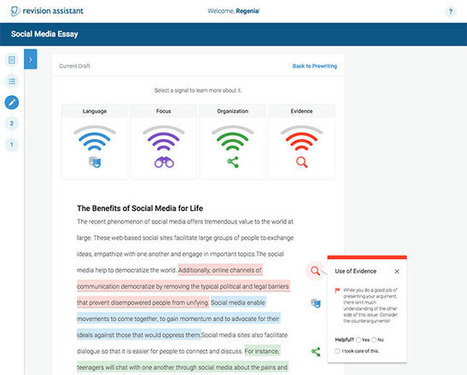 Your new post is loading...
 Your new post is loading...
Schools need updating for the Internet age.
EXCLUSIVE: Police change exam after officers training to be detectives share questions.
The exam was cancelled after six minutes due to fears it was compromised, a student said.
A team of faculty found that going beyond the same old papers and quizzes created novel learning activities that engaged students and promoted learning.
Turnitin, a company typically known for catching plagiarism in students’ writing assignments, is refocusing its efforts on the needs of instructors with its newest formative writing tool, Revision Assistant.
There is no single best way to handle proctoring for digital courses, as this community college system pilot discovered. By Dian Schaffhauser USING ANSWERS PROVIDED BEFOREHAND to pass online tests; checking a cell phone display to look up a formula in a closed-book exam; conferring with an unseen person in the room for the right responses. Cheating in an online course seems like it could be a simple matter for a motivated student.
Most of us have had formal or informal feedback throughout our lives. The way in which we have been assessed very likely has had a fundamental effect on our learning and career progression. Assessment is one of the most important parts of learning and teaching and whether institutions get this right or wrong has a huge impact on students’ lives and careers.
Jisc’s new guide Effective Assessment in a Digital Age demonstrates how technology can significantly improve the experience of assessment and feedback. As many higher education institutions are reviewing their assessment strategies, Jisc is looking at the transformative effects of technology that increase learner autonomy, enhances the quality of the assessment experience and improves teaching efficiency.
Digital Trials
This year we will be undertaking 15 Level 1 Trial examinations - a “Trial” is a practice assessment that does not count towards a student’s NCEA. The subjects we plan to trial this year are:
Art History
Business Studies
Classical Studies
Economics
English
French
Geography
Samoan
Health
History
Media Studies
Physics
Spanish
Science
Te Reo Rangatira.
Note that externally assessed standards will be used in all these subjects. The Trial examinations will be available at two times - the first opportunity will be 11-29 September and the second will be 16 - 27 October.
Schools will have control over when they offer the Digital Trials within this period. The setup, invigilation and marking of the Digital Trials will be undertaken by schools. The Digital Trials can either be used as a practice examination completed in one sitting, completed over multiple sessions as a classroom activity, or used for revision.
What’s been left out of the conversation about flipped classrooms, however, is why and how we might also need to flip our assessment practices.
Hot off the presses, here is a free PDF post-print of our latest article on contract cheating: Dawson, P., & Sutherland-Smith, W. (in press). Can markers detect contract cheating? Results from …
Students often find themselves uploading their content — their creative work — into the learning management system. Perhaps they retain a copy of the file on their computer; but with learning analytics and plagiarism detection software, they still often find themselves having their data scanned and monetized, often without their knowledge or consent. — Audrey... Read More
It doesn’t matter how assessments are given to students, as students can still find a way to cheat.
Dr. Wells recently gave a talk to faculty at Bishop’s University on assessment and evaluation strategies, hosted by the BU Teaching and Learning Centre (TLC). Below is one of the many ideas she presented during her workshop. Dr. Jessica Riddell, Chair, TLC If there is one thing we mostly agree on in the academy, is … Continue reading Colour-Coded Grading: How to Make Marking more Transparent – Dr. Elizabeth Wells, Mount Allison University →
|
Standardised tests restrict how well students with disability can do, which reinforces the idea that there are things they can't do that children without disability can.
OPINION: Exams can be an extremely effective teaching tool.
Blackboard is planning to introduce a new feature in its learning management system later this year to help instructors grade students’ participation in class discussions online. The feature, called the “discussion forum recommended grade,” will use computer algorithms to analyze students’ posts in class discussion forums.
John Whitmer, learning analytics and research director at Blackboard, said that instructors want to use discussion forums to judge students’ participation, but that doing so is time-consuming and difficult since the forums were designed for discussion rather than assessment. These discussion forums are often underused by students, said Whitmer, since there is often little incentive for students to engage
Via Kim Flintoff
Like many colleagues, I have attended a number of interesting talks on the ‘flipped classroom’ approach, whereby, in a role reversal, the main delivery of information takes place outsid…
High grades might be awarded to papers that show the structural features of highly persuasive writing -- papers that follow the “persuasion script”, so to speak.
New technology keeps students honest when taking online tests.
In college classrooms, detecting cheating can sometimes be as simple as catching a student looking at someone else’s exam. But for online educators, who may have students in various corners of the country, catching cheating on an exam, assignment or essay is a lot more difficult.
Thanks to digital tools with elements of analytics and online proctoring, universities can keep cheating at bay.
Via Miloš Bajčetić
It’s ironic that assessment in schools is most often “something adults do to students,” as Rick Stiggins puts it, because all humans are highly evolved for learning, and self-assessment is a powerful tool all learners use. Whether you are trying to master a recipe, solve an equation, improve your golf swing, you continually ask yourself questions such as “Have I learned to do what I need to do?” “What did I do wrong?” “How do I improve?” and, most importantly, “How did I learn that?” All, assessment. Wouldn’t it be great if schools didn’t turn a
Via Ana Cristina Pratas
Eric Resnis, CTE Assessment Coordinator & University Libraries Organizational Effectiveness Specialist, presented a CTE seminar on Flipped Assessment: What Does It Mean? How Might I Use It? Why Might I Use It? The hallmark of flipped assessment is that it engages students from the outset of a course in how their learning will be assessed. Note: Flipped assessment does not require a flipped classroom format!
Eric presented six strategies for flipping assessment (noting that these may not work in all classrooms or with all students):
World first Australian research has warned against students who buy assignments over the internet, suggesting they risk being caught two times out of three.
A new study shows that the popular edtech devices can improve fact retention but hinder deeper understanding.
Via Peter Mellow
Many administrators and faculty members say online exam proctoring works and is vital to expanding online programs. But some question, at what cost?
It may sound like something used by one of Harry Potter's wayward classmates at Hogwarts, but invisible ink has now been revealed by the university ombudsman as the latest university - New Zealand Herald
|
 Your new post is loading...
Your new post is loading...
 Your new post is loading...
Your new post is loading...































